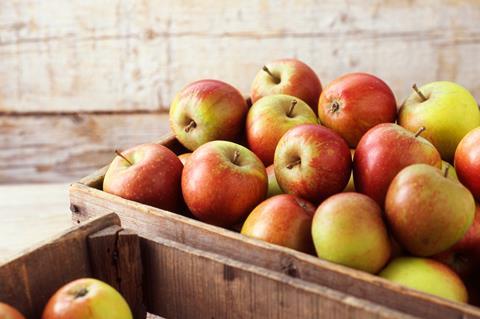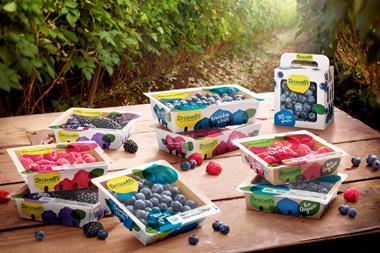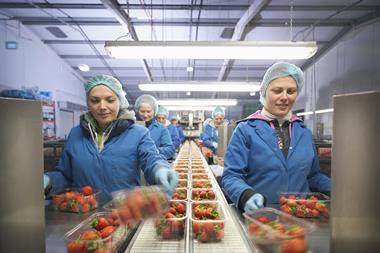
Aldi has regained its lead over Tesco as the biggest supporter of British apples.
New data from British Apples & Pears revealed the discounter held a 24.1% share of all British apples sold during May, up 4.5% percentage points on April’s share of 19.6%. This came despite Aldi having just 10.1% total grocery market share. Tesco’s share of 18.9% in May was down from 20.7% in April.
It comes amid concern in the UK apple sector about a perceived lack of support from some supermarkets for British growers over both returns and market access.
Aldi first overtook Tesco, which at 27.1% boasts a grocery market share almost three times larger than the discounter, in March, as it cited the success of its “long-term partnerships with our suppliers”.
The retailer last week reinforced this position by penning a new supply deal with Britain’s largest independent apple grower AC Goatham & Sons to provide 100% of its British apples.
The £30m agreement will see the business supply an estimated 45 million units to stores across the UK over the next 12 months, Goatham said.
The Kent-based grower had previously held a contract for 50% of the discounter’s supply, having built up supply levels since it first began working with Aldi in 2016.
Steve Barwick, commercial director at Goatham, told The Grocer the business was “absolutely thrilled” at agreeing the exclusive deal.
Apple growers forced into the red despite supermarket price hikes
“We weren’t ever expecting Aldi to place so much risk, in one sense, in one supplier but actually they went through quite an admirable due diligence process,” he said.
“It wasn’t all around price as so many of these tenders are,” he added. “When we work really really hard to do a really good job for a business like Aldi, it’s just wonderful to see that that’s been recognised.”
The other 50% of Aldi’s supply had previously been covered by Bardsley England. However, Barwick said Goatham had “always covered shortages” and “extended the season past the point where Bardsley would run out”.
He explained that the way Goatham had “constantly tried to push the boundaries for how long we give the retailer British fruit for” was something Aldi had been keen to support.
“The investment we have made in the past 10 years has put us in a really good position where we have not had to start orchard planting on a rigorous programme or infrastructure investment because investment had been made,” said Barwick.
Goatham is expanding orchards in Kent and is expected to be able to continue to grow production annually until the mid-2030s as 75% of its orchards are under 10 years old. It comes despite many growers scaling back production over the past year due to soaring costs, labour issues and low returns.
Where have Britain’s missing apples gone?
The supplier would also continue its relationship with Sainsbury’s, Barwick confirmed, but said it would be making “some efficiencies” with smaller contracts.
“Shoppers want quality British produce at the lowest prices, particularly at the moment,” said Julie Ashfield, managing director of buying at Aldi UK. ”Aldi is a proud champion of British produce and the relationships we have with amazing British growers like AC Goatham & Son help us deliver the very best products at unbeatable prices for our customers.”
BAP’s data also showed that Asda continued to underperform on the number of British apples sold compared to its share of the grocer market. The retailer accounted for 3.6% of all British apples sold in May, despite holding a 13.9% grocery market share.
This represented a decline on previous months as in April it stocked 5.3% and in March held a share of 4.6%.
”We recognised there was an opportunity to grow our share last season due to more UK fruit becoming available, so Asda increased its UK grown Apples participation from 7% to 20% last season,” said an Asda spokesman.
“This in turn increased Asda’s UK-grown apples share last season 2022/23 to 5% from 2% the previous year according to our data, and we are now actively talking to growers to increase our share further in the coming season.”



















No comments yet